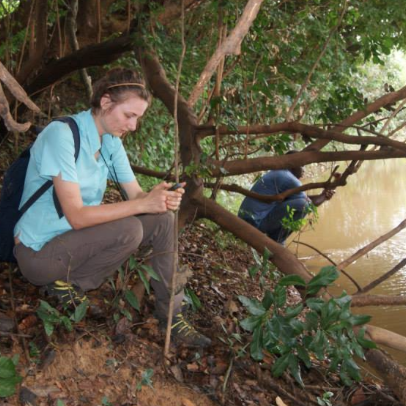About This Project
Orang-utan is a Malay word that means person of the forest. Every year hundreds of people visit Malaysia and Indonesia to spend weeks or months working with these incredible great apes. But what kind of impact is this having on conservation and in what ways can it be improved? In this project I will visit several field sites across the island of Borneo to interview volunteers and staff, culminating in a best practice guidelines to operating successful volunteer tourism projects.
Ask the Scientists
Join The DiscussionWhat is the context of this research?
Although there have been many studies on the impact of eco-tourism on great apes, fairly few studies have been done with a focus on orangutans, and even fewer still on volunteer tourism.
There are currently thought to be between 45,000 and 60,000 orangutans left on the island of Borneo, and everyday more of these great apes are orphaned due to deforestation, hunting and the pet trade. Many of these orphans will end up in wildlife sanctuaries which are also overflowing with other native species from the small sun bear to the elusive civet.
In 2013, Malaysia alone received 25.7 million tourists, many of whom visited these various wildlife sanctuaries as either day visitors or volunteers just for a chance to the iconic orange ape.
What is the significance of this project?
While eco-tourism (traveling with the intention to see wild places or things) has been evolving for decades, adding volunteers to the mix has the potential to change everything.
Now is the time to shape volunteer tourism to become one of the most powerful tools in conservation. It has the potential to contribute significant amounts of money to projects, educate people about animals, environments and foreign cultures and provide much needed physical support to care centers.
By assessing the different volunteer experiences at 4 different locations across the island of Borneo, as well as identifying the 'average' volunteer, changes can be made to improve the experience for staff, volunteers, and of course, the orangutans.
What are the goals of the project?
During my 12 week stay on the island of Borneo I plan to interview staff and volunteers at set intervals throughout the volunteer's stay. This will give me an idea of how the volunteers attitudes and expectations evolve throughout the course of their stay and how the staff deals with these changes.
I have chosen 4 different volunteer programs to include in my study as each of these 4 programs offer different experiences for the volunteers. This will help me to create an average volunteer profile based on what experiences can be offered.
Ultimately a list of suggested improvements will be given to the different programs that aim to enhance the volunteer experience, create a more economically effective program, as well as amplify the positive effects on conservation.
Budget
This research project is instrumental in shaping the development of volunteer tourism. While initial research has been conducted ex situ the only true path for advancement lies in research being conducted in situ.
This budget will allow for more accurate in-person interviews, assessment of impact on a local level as well as observational data collection. It includes the cost of visiting 4 different volunteer project sites over the course of 12 weeks.
This on-the-ground study will have lasting impacts on the conservation status of orangutans and other native Bornean wildlife.
Meet the Team
Team Bio
I am conducting this project for my MSc in Primate Conservation from Oxford Brookes University, in Oxford, UK.
I have always had a passion for animals and conservation. During my studies as an undergraduate at Southern Methodist University in Dallas, Texas I volunteered at a big cat sanctuary, interned at the Palm Beach Zoo and eventually worked at the Dallas Zoo. While I have worked with almost every species of animal imaginable my passion lies in primates.
In the summer of 2014 I went to Sierra Leone with the Tonkolili Chimpanzee Project where I researched the possible instances of chimpanzees crossing the Pampana River. At this field site there was a high amount of human-wildlife conflict which led to my interest in human-primate interactions focusing on great apes.
While I believe research is important, I know that conservation would be doomed without a collaboration with outreach and education. This is why I not only run my own conservation and science blog Endangered Living, but will also use my time in the field to engage with several American schools through virtual field trips. These 3rd through 5th graders will follow me on my journey through the field learning about wildlife, Bornean culture and conservation.
Outside of my time working with animals I also studied multi-media journalism while at SMU. I was not only published in my school paper, but also the Dallas Morning News along with several other animal-related news sites.
Additional Information

A young orangutan at Sepilok Orang Utan Rehabilitation Centre in Sabah, Malaysia. Photo courtesy of CIFOR

Ecotourists at Sepilok Orang Utan Rehabilitation Centre in Sabah, Malaysia. Photo courtesy of CIFOR

Researcher Sarah Bell collecting GPS points along the Pampana River in Sierra Leone, 2014.
Project Backers
- 23Backers
- 103%Funded
- $3,178Total Donations
- $138.17Average Donation
